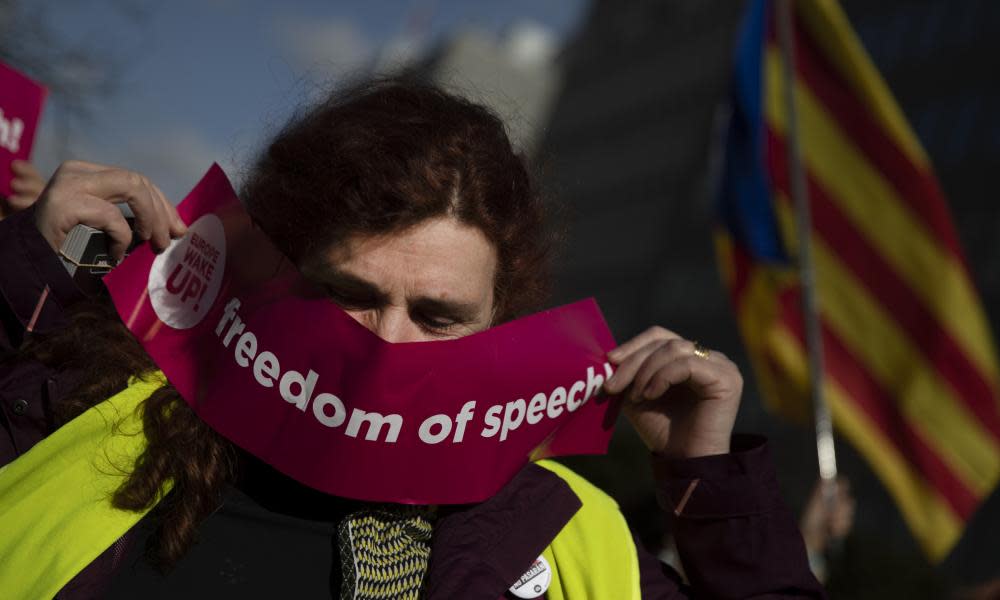Like Pablo Hasél, Spain wants me jailed for rap lyrics – but artists must not self-censor

The arrest of Pablo Hasél this month, a Spanish rapper – like me – who is accused of glorifying terrorism and insulting the monarchy in his lyrics, didn’t surprise me. When I was 18, I wrote a song about the Spanish king, the police arrested me and I was sentenced to three and a half years in jail. The day they came to take me to prison, I fled to Belgium and have been here ever since, despite the best efforts of Spain to have me extradited. It seemed like a joke – almost four years in jail for a song. But it wasn’t: there are 18 rappers in Spain facing jail for similar charges.
Related: Angry words: rapper's jailing exposes Spain's free speech faultlines
Rap music has a long history of explaining truths and telling stories. Hip-hop comes from the US, where it reflects the rage of Black Americans: it tells us about their experiences, their struggles and the violence they have suffered. In my music, I speak about going against power. I don’t want to label myself and my views but I am on the left wing: I am in favour of human rights and against the tyranny of economic power. Like drill rappers in the UK, or hip-hop artists in the US, I have a duty to talk about what I see around me.
Rap also has a history of talking about people who fight for what they believe in, including those who use arms. Hasél has the same right to talk in his lyrics about [Basque separatist group] ETA as a theatre director does, or a book author. Hasél has the same right to do what he does as Quentin Tarantino does to show violence in his films, or Nabokov did to write about a man infatuated with a child. Music is not a political pamphlet or an article in a newspaper – it is fiction; it’s art.
People talk about freedom of expression in Spain when they talk about my case, or Hasél’s. But Spain doesn’t have a problem with freedom of expression – it has a problem with freedom of ideology. There are people in Spain who talk about how it is OK to kill women; who say that trans people aren’t people; who are against gay marriage. Spain was under a dictatorship four decades ago. And we haven’t done the same work to deal with our past that they have done in Germany or Italy. If you don’t learn from your past, you are condemned to repeat it. Spain’s current government has talked about abolishing the “gag law”, introduced by the previous government, which restricts freedom of expression. But they haven’t done anything about it.
The worst kind of censorship is self-censorship. In Spain, some rappers have started to censor themselves because they don’t want to go to jail. People are scared to write songs that stand up to power. And that’s really sad. In a democracy, in the 21st century, governments should support music, even if it goes against power and it makes them uncomfortable. Last year, I made an album, EPD, with funding from the Belgian government. They are giving me money to do exactly what the Spanish government wants to stop me from doing.
The cases we have seen in Spain – Hasél’s case, my own and the 18 others facing jail – are the kinds you see in Iran, Turkey, Saudi Arabia or China. It shouldn’t happen in a democracy. In the US, Madonna once talked about blowing up the White House and she didn’t go to jail. But things are getting worse around the world and censorship is growing. That revolts me. You should never use jail to silence an artist. If they say something you don’t like, then you can go and protest outside their gigs, you can criticise them and you can go and collect signatures against them. You can oppose them in many ways. But you can’t – you mustn’t – use a jail sentence.
Related: Spanish people take to streets over rapper's jailing – in pictures
I’ve done a lot of interviews over the past few days, and a lot of the Spanish and Catalan media want to talk about the violence at recent demonstrations. But that’s not the point: demonstrations are a way to make change; social movements, solidarity and organisation can bring about progress. Only the people can save the people. That is what we have always seen, throughout history.
I do not think too much about my own future. I am studying, I’m learning French and English, and I am focused on being here in Belgium. If one day I can go back to Spain, I will think about that then. But I want to live my life, not the life a judge says I should live. If I had actually done something wrong, Belgium would have extradited me. But they haven’t.
There are serious problems in Spain: the police used violence on people in Catalonia who were trying to vote in a referendum; the people who arranged the referendum are in jail; and Spain has some of the highest levels of poverty among young people in Europe. In Spain there is a lot of poverty, lots of police violence, lots of corruption. And it is entirely right that people should make songs protesting about that.

 Yahoo News
Yahoo News 
